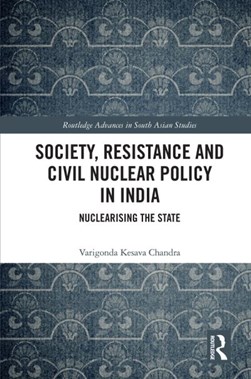-
BROWSE 1000s OF BOOKS IN STOCK
-
FREE DELIVERY ON ORDERS OVER €10
Society, resistance, and civil nuclear policy in India
PAPERBACK
Series: See all books in this series
This book explores how anti-nuclear social movements impact the state's civil nuclear policy and its implementation by presenting a historical-comparative case study of anti-nuclear movements in India. Drawing on social movement theory and empirical methods, the book demonstrates that the ability for anti-nuclear movements to impede the inception of nuclear plants - a key element of India's civil nuclear policy - is determined by the movement's collective action repertoires, the politicisation of nuclear power and the state's larger developmental paradigm, and the openness of state input structures. The case studies of anti-nuclear movements in Haripur, Kudankulam and Kovvada demonstrate how the implementation of civil nuclear policy is also determined by the state's technical and financial capacity and effective international collaboration. With a focus on theorisation of social movements and their impact, combined with empirical studies of anti-nuclear movements, as well as the historical trajectory of civil nuclear development, the book adds a new prism to the study of India's civil nuclear policy and anti-nuclear opposition. It will be of interest to researchers working on social movements, state-society relations, energy studies and civil nuclear energy in the context of South Asia and the Global South.
€56.54

169 Reward Points
In stock online
Extended Range: Delivery in 2-3 working days
Extended Range: Delivery in 2-3 working days
Free Delivery on this item
Any purchases for more than €10 are eligible for free delivery anywhere in the UK or Ireland!
This book explores how anti-nuclear social movements impact the state's civil nuclear policy and its implementation by presenting a historical-comparative case study of anti-nuclear movements in India. Drawing on social movement theory and empirical methods, the book demonstrates that the ability for anti-nuclear movements to impede the inception of nuclear plants - a key element of India's civil nuclear policy - is determined by the movement's collective action repertoires, the politicisation of nuclear power and the state's larger developmental paradigm, and the openness of state input structures. The case studies of anti-nuclear movements in Haripur, Kudankulam and Kovvada demonstrate how the implementation of civil nuclear policy is also determined by the state's technical and financial capacity and effective international collaboration. With a focus on theorisation of social movements and their impact, combined with empirical studies of anti-nuclear movements, as well as the historical trajectory of civil nuclear development, the book adds a new prism to the study of India's civil nuclear policy and anti-nuclear opposition. It will be of interest to researchers working on social movements, state-society relations, energy studies and civil nuclear energy in the context of South Asia and the Global South.

169 Reward Points
Any purchases for more than €10 are eligible for free delivery anywhere in the UK or Ireland!
€56.54

169 Reward Points
Any purchases for more than €10 are eligible for free delivery anywhere in the UK or Ireland!
Product Description
This book explores how anti-nuclear social movements impact the state's civil nuclear policy and its implementation by presenting a historical-comparative case study of anti-nuclear movements in India. Drawing on social movement theory and empirical methods, the book demonstrates that the ability for anti-nuclear movements to impede the inception of nuclear plants - a key element of India's civil nuclear policy - is determined by the movement's collective action repertoires, the politicisation of nuclear power and the state's larger developmental paradigm, and the openness of state input structures. The case studies of anti-nuclear movements in Haripur, Kudankulam and Kovvada demonstrate how the implementation of civil nuclear policy is also determined by the state's technical and financial capacity and effective international collaboration. With a focus on theorisation of social movements and their impact, combined with empirical studies of anti-nuclear movements, as well as the historical trajectory of civil nuclear development, the book adds a new prism to the study of India's civil nuclear policy and anti-nuclear opposition. It will be of interest to researchers working on social movements, state-society relations, energy studies and civil nuclear energy in the context of South Asia and the Global South.
Product Details
ISBN9780367607555
FormatPAPERBACK
PublisherROUTLEDGE (01 August. 2022)
No. of Pages214
Weight220
Language English
Dimensions 234 x 234 x 19

